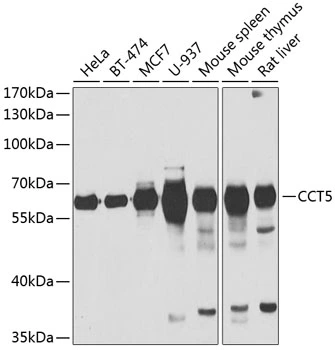![Immunohistochemical analysis of frozen sections of zebrafish muscle, 5 hpf, using TCP1 epsilon antibody [N1C1] (GTX110167) at 1:100 dilution. Immunohistochemical analysis of frozen sections of zebrafish muscle, 5 hpf, using TCP1 epsilon antibody [N1C1] (GTX110167) at 1:100 dilution.](https://www.genetex.com/upload/website/prouct_img/normal/GTX110167/GTX110167_40037_IHC_Z_22111423_717.webp)
Immunohistochemical analysis of frozen sections of zebrafish muscle, 5 hpf, using TCP1 epsilon antibody [N1C1] (GTX110167) at 1:100 dilution.
TCP1 epsilon antibody [N1C1]
GTX110167
ApplicationsImmunoFluorescence, ImmunoPrecipitation, Western Blot, ImmunoCytoChemistry, ImmunoHistoChemistry, ImmunoHistoChemistry Frozen, ImmunoHistoChemistry Paraffin
Product group Antibodies
ReactivityHuman, Mouse, Zebra Fish
TargetCCT5
Overview
- SupplierGeneTex
- Product NameTCP1 epsilon antibody [N1C1]
- Delivery Days Customer9
- Application Supplier NoteWB: 1:500-1:20000. ICC/IF: 1:100-1:1000. IHC-P: 1:100-1:1000. IP: 1:100-1:500. *Optimal dilutions/concentrations should be determined by the researcher.Not tested in other applications.
- ApplicationsImmunoFluorescence, ImmunoPrecipitation, Western Blot, ImmunoCytoChemistry, ImmunoHistoChemistry, ImmunoHistoChemistry Frozen, ImmunoHistoChemistry Paraffin
- CertificationResearch Use Only
- ClonalityPolyclonal
- Concentration1 mg/ml
- ConjugateUnconjugated
- Gene ID22948
- Target nameCCT5
- Target descriptionchaperonin containing TCP1 subunit 5
- Target synonymsCCT-epsilon, CCTE, HEL-S-69, HSNSP, PNAS-102, TCP-1-epsilon, T-complex protein 1 subunit epsilon, chaperonin containing T-complex polypeptide 1 subunit 5, chaperonin containing TCP1, subunit 5 (epsilon), epididymis secretory protein Li 69
- HostRabbit
- IsotypeIgG
- Protein IDP48643
- Protein NameT-complex protein 1 subunit epsilon
- Scientific DescriptionThis gene encodes a molecular chaperone that is member of the chaperonin containing TCP1 complex (CCT), also known as the TCP1 ring complex (TRiC). This complex consists of two identical stacked rings, each containing eight different proteins. Unfolded polypeptides enter the central cavity of the complex and are folded in an ATP-dependent manner. The complex folds various proteins, including actin and tubulin. Alternate transcriptional splice variants of this gene have been observed but have not been thoroughly characterized. [provided by RefSeq]
- ReactivityHuman, Mouse, Zebra Fish
- Storage Instruction-20°C or -80°C,2°C to 8°C
- UNSPSC41116161

![Non-transfected (–) and transfected (+) 293T whole cell extracts (30 μg) were separated by 7.5% SDS-PAGE, and the membrane was blotted with TCP1 epsilon antibody [N1C1] (GTX110167) diluted at 1:6000. Non-transfected (–) and transfected (+) 293T whole cell extracts (30 μg) were separated by 7.5% SDS-PAGE, and the membrane was blotted with TCP1 epsilon antibody [N1C1] (GTX110167) diluted at 1:6000.](https://www.genetex.com/upload/website/prouct_img/normal/GTX110167/GTX110167_40037_20161110_WB_shRNA_watermark_w_23060500_212.webp)
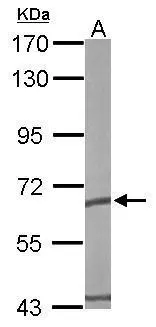
![Immunoprecipitation of TCP1 epsilon protein from 293T whole cell extracts using 5 μg of TCP1 epsilon antibody [N1C1] (GTX110167). Western blot analysis was performed using TCP1 epsilon antibody [N1C1] (GTX110167). EasyBlot anti-Rabbit IgG (GTX221666-01) was used as a secondary reagent. Immunoprecipitation of TCP1 epsilon protein from 293T whole cell extracts using 5 μg of TCP1 epsilon antibody [N1C1] (GTX110167). Western blot analysis was performed using TCP1 epsilon antibody [N1C1] (GTX110167). EasyBlot anti-Rabbit IgG (GTX221666-01) was used as a secondary reagent.](https://www.genetex.com/upload/website/prouct_img/normal/GTX110167/GTX110167_40037_20150604_IP_w_23060500_351.webp)
![TCP1 epsilon antibody [N1C1] detects TCP1 epsilon protein at cytoplasm in human breast carcinoma by immunohistochemical analysis. Sample: Paraffin-embedded human breast carcinoma. TCP1 epsilon antibody [N1C1] (GTX110167) diluted at 1:500.
Antigen Retrieval: Citrate buffer, pH 6.0, 15 min TCP1 epsilon antibody [N1C1] detects TCP1 epsilon protein at cytoplasm in human breast carcinoma by immunohistochemical analysis. Sample: Paraffin-embedded human breast carcinoma. TCP1 epsilon antibody [N1C1] (GTX110167) diluted at 1:500.
Antigen Retrieval: Citrate buffer, pH 6.0, 15 min](https://www.genetex.com/upload/website/prouct_img/normal/GTX110167/GTX110167_40037_20151227_IHC-P_w_23060500_854.webp)
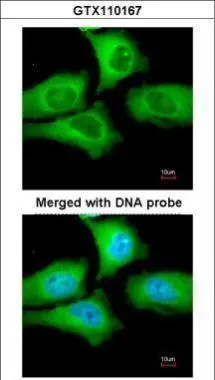
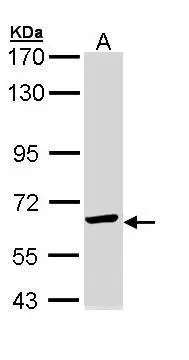
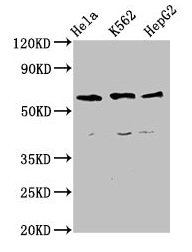
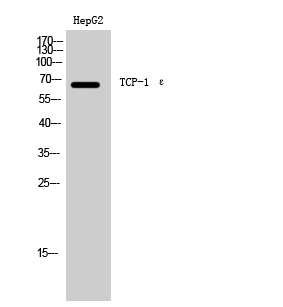

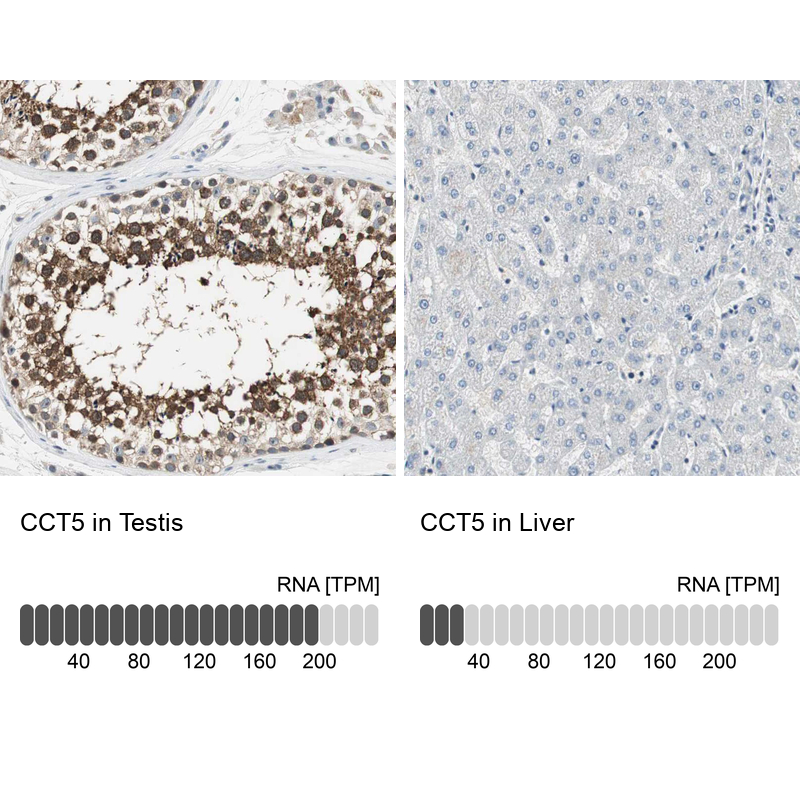
![Immunohistochemical analysis of frozen sections of zebrafish muscle, 5 hpf, using TCP1 epsilon antibody [N1N3] (GTX109908) at 1:100 dilution.](https://www.genetex.com/upload/website/prouct_img/normal/GTX109908/GTX109908_40030_IHC_Z_22111423_644.webp)
![TCP1 epsilon antibody [GT639] detects TCP1 epsilon protein at centrosome and cytoplasm by immunofluorescent analysis. Sample: HeLa cells were fixed in ice-cold MeOH for 5 min. Green: TCP1 epsilon stained by TCP1 epsilon antibody [GT639] (GTX631668) diluted at 1:500. Blue: Hoechst 33342 staining. Scale bar= 10 μm.](https://www.genetex.com/upload/website/prouct_img/normal/GTX631668/GTX631668_43556_20190710_ICC_IF_w_23061202_341.webp)
